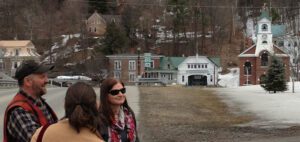
An important service offered by our project is the Vermont Small Business Development Center’s digital workshops. They’re designed to teach small businesses how to leverage such hot digital tools as Cloud Computing, Mobile Marketing, Social Media, and Using Google Tools.
Based on the Vermont Digital Economy Project Team’s recent discussions with business leaders and nonprofits in flood-impacted communities, it’s become very clear that there is great interest among many organizations in these topics. As a result, several workshops are being scheduled near Killington, Wilmington, Royalton, and other communities, to meet this expressed need.
It is also clear that we have a great opportunity to create even more specialized workshops that are highly relevant to specific constituent groups in flood impacted communities, such as small rural farms and nonprofits, libraries, and food shelves. Every organization we have talked to so far has expressed a need for assistance in becoming more automated, more Web-friendly, and so on. But they do not know where to focus first, and they have limited time and capital. Therefore, they’ve asked us to find free and/or inexpensive digital tools that are specifically designed to make a real impact regarding their unique circumstances.
For example, in Bethel, Carl Russell of Earth Wise Farm and Forest took on the task of reaching out to other farmers and loggers in his area, in order to establish which of the VtSBDC’s workshops would be most in demand. But, instead, he came back with this analysis: “Websites and social media are going to have minimal impact on farmers and loggers in this region. We want you to provide services that specifically enhance our businesses within the context of where we live, and how we do business.”
After meeting with Carl and doing additional research, we discovered that UVM Extension (at the University of Vermont) is embarked on a project to create mobile apps for Vermont farmers. The first of these apps is expected to be launched next year, and there are many more to come. Carl’s honest analysis led us to a wealth of knowledge about efforts already in motion to create digital tools that solve the unique challenges of Vermont’s rural farms. This will lead to specialized, highly relevant workshops to help train Carl and others to use these important tools.
At our first exploratory nonprofit workshop held in Ludlow this past week, we gained valuable insight into the challenges confronting small nonprofit organizations, such as Black River Good Neighbors, which provides food and limited financial assistance to qualified individuals and families in Ludlow, Cavendish, Mount Holly and Plymouth, and also operates a food shelf and thrift store.
Peter LaBelle, the president of the Black River Good Neighbors board of directors, said: “We have to find better ways to reach our two entirely different audiences. The people who need our services, who are highly geographically concentrated and may be limited in their ability to get online to access information about us; and our donor community, which is geographically diverse, but more likely to be older adults.”
With leadership from Rob Fish, our nonprofit advisor and community organizer, we captured several ideas that will be turned into nonprofit-specific workshops, including teaching nonprofits how to capture email addresses, how to design and execute an eNewsletter with an option for online donations, and how to implement mobile applications to maximize donations at large events by enabling donations and purchases via credit card.
These are just two examples of how our process of talking to the businesses and nonprofits in our target communities helps bring to light unique challenges that can be solved by researching and then putting together training on highly relevant digital tools, targeted to specific industries and nonprofit verticals.
